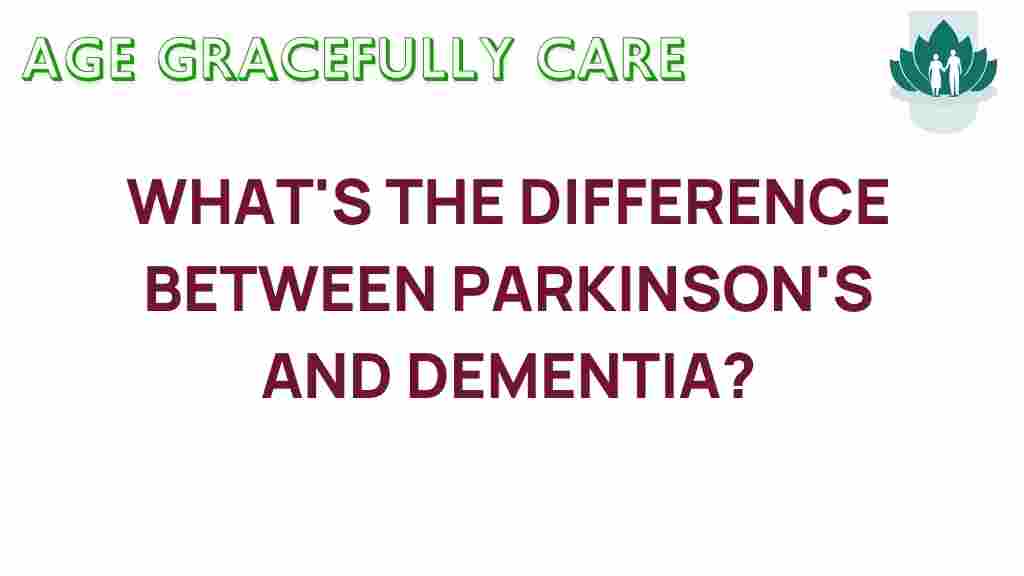Parkinson’s vs. Dementia Explained
Understanding neurological disorders such as Parkinson’s and dementia is crucial for patients and caregivers alike. Both conditions share certain symptoms but also exhibit significant differences. This article will delve into the nuances of these two conditions, focusing on symptoms, diagnosis, treatment options, and how they relate to cognitive decline and movement disorders.
What is Parkinson’s Disease?
Parkinson’s disease is a progressive neurological disorder that primarily affects movement. It occurs when nerve cells in the brain, particularly those that produce dopamine, begin to die off. This leads to a variety of motor symptoms, including:
- Tremors: Involuntary shaking, often starting in one hand.
- Bradykinesia: Slowness of movement.
- Muscle Rigidity: Stiffness in the limbs and trunk.
- Postural Instability: Impaired balance and coordination.
Patients with Parkinson’s may also experience non-motor symptoms such as sleep disturbances, depression, and cognitive changes. Understanding the full spectrum of symptoms is essential for effective management.
What is Dementia?
Dementia is an umbrella term that describes a range of symptoms affecting memory, thinking, and social abilities severely enough to interfere with daily life. It is not a specific disease but rather a syndrome caused by various brain disorders, including Alzheimer’s disease, vascular dementia, and Lewy body dementia. Key symptoms of dementia include:
- Memory Loss: Difficulty remembering recent events or conversations.
- Difficulty Communicating: Struggling to find the right words.
- Impaired Judgment: Poor decision-making abilities.
- Changes in Mood and Personality: Increased anxiety or depression.
The Overlap: Parkinson’s and Dementia
While Parkinson’s disease primarily affects movement, cognitive decline can occur as the disease progresses. In fact, a significant number of individuals with Parkinson’s may develop dementia, known as Parkinson’s disease dementia (PDD). This condition combines the motor symptoms of Parkinson’s with cognitive challenges seen in dementia. Understanding the relationship between these two neurological disorders is essential for effective treatment and care.
Symptoms of Parkinson’s Disease and Dementia
Both conditions exhibit overlapping symptoms, making it essential to recognize the distinctions for accurate diagnosis and treatment. Here are some shared symptoms:
- Cognitive Decline: Both conditions may lead to issues with memory and thinking.
- Depression and Anxiety: Emotional changes are common in both disorders.
- Sleep Disturbances: Insomnia and other sleep issues can affect patients.
Diagnosis: How are Parkinson’s and Dementia Identified?
The diagnostic process for both Parkinson’s and dementia involves a comprehensive evaluation. Here are the steps typically taken:
Step 1: Medical History Review
The healthcare provider will assess the patient’s medical history, including any symptoms experienced, family history of neurological disorders, and overall health status.
Step 2: Physical and Neurological Examination
A thorough physical examination helps identify movement disorders associated with Parkinson’s, while a neurological examination assesses cognitive functions related to dementia.
Step 3: Cognitive Tests
Various cognitive tests may be administered to evaluate memory, problem-solving skills, and other cognitive abilities. These tests help in identifying the presence and extent of cognitive decline.
Step 4: Imaging Tests
Brain imaging techniques, such as MRI or CT scans, may be utilized to rule out other causes of symptoms and evaluate brain structure.
For more detailed information on the diagnostic criteria for these conditions, you can visit this resource.
Treatment Options for Parkinson’s and Dementia
While there is currently no cure for either Parkinson’s or dementia, various treatment options exist to manage symptoms and improve quality of life.
Treatment for Parkinson’s Disease
1. **Medications:** The primary treatment for Parkinson’s includes medications that increase dopamine levels or mimic its action. Common drugs include:
- Levodopa/Carbidopa
- Dopamine Agonists
- MAO-B Inhibitors
2. **Physical Therapy:** Physical therapy can help improve mobility and reduce stiffness.
3. **Surgical Options:** For some patients, surgical interventions such as Deep Brain Stimulation (DBS) may be considered.
Treatment for Dementia
1. **Medications:** There are medications available to help manage symptoms of dementia, including:
- Cholinesterase Inhibitors (e.g., Donepezil)
- Memantine
2. **Cognitive Stimulation Therapy:** Engaging in activities that stimulate thinking can help maintain cognitive function.
3. **Supportive Care:** Creating a supportive environment for patients is crucial in managing dementia.
For additional resources on treatment options, you can check this link.
Understanding Cognitive Decline in Parkinson’s Disease
Cognitive decline in Parkinson’s may manifest in various ways, including:
- Difficulty concentrating
- Problems with planning and organizing
- Changes in visual-spatial abilities
It is essential for caregivers and family members to recognize these symptoms early and seek appropriate support and interventions.
Managing Movement Disorders
Both Parkinson’s and certain forms of dementia can lead to movement disorders. Here are some strategies to manage these issues:
- Regular Exercise: Engaging in physical activity can improve mobility and balance.
- Occupational Therapy: This can help individuals adapt their daily activities to maintain independence.
- Assistive Devices: Using walkers or canes can aid those with mobility challenges.
Tips for Caregivers
Caring for someone with Parkinson’s or dementia can be challenging. Here are some tips to help:
- Stay informed about the conditions.
- Encourage independence while providing support.
- Establish routines to provide structure.
- Practice patience and empathy.
Conclusion
Understanding the differences and similarities between Parkinson’s and dementia is essential for effective management and care. Early diagnosis can lead to better treatment outcomes and improved quality of life for patients. By recognizing symptoms, seeking appropriate treatment, and providing supportive care, we can help those affected by these neurological disorders navigate their challenges more effectively.
If you or a loved one is experiencing symptoms associated with Parkinson’s or dementia, consider consulting a healthcare provider to explore the best options for diagnosis and treatment.
This article is in the category Health and created by AgeGracefullyCare Team
